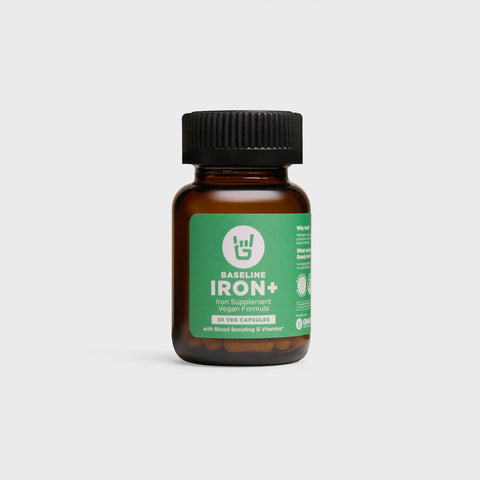Training and nutrition are two important pillars in life, but if you’re foregoing sleep, you’re missing out on a dependable way to improve your recovery and even performance.
Sleep is your body’s dedicated time to rest and recover, and sleep deprivation has several negative consequences including:
- Impaired strength and endurance
- Impaired decision making, reaction times, and accuracy
- Weakened immune system
- Increased cortisol <1>
- Decreased insulin sensitivity and impaired glucose tolerance <2>
Interestingly, sleep disturbances can be both a trigger and symptom of overtraining (3). In this sense, training and sleep can become a vicious cycle for the athlete. With all that we know about the benefits of sleep, no one – especially athletes – should be going by the phrase, “I’ll sleep when I’m dead.”
YOUR CIRCADIAN RHYTHM
Your circadian rhythm follows a 24-hour cycle and controls your sleep-wake schedule. It responds to lightness and darkness, and this, of course, explains why we are awake during the day and sleep at night (well, most of us!).
The two hormones at play here are melatonin and cortisol. They tend to have an inverse relationship – when cortisol is up, melatonin is down (and vice versa). Unfortunately, sometimes melatonin and cortisol do not behave as we want them to, causing us to have difficulty falling asleep, waking up in the middle of the night, and feeling drowsy in the morning. Your nutrition and lifestyle directly affect these hormones, which have downstream effects on your recovery and performance.

melatonin
Melatonin is a hormone produced in the pineal gland that helps make you sleepy in the evening, but it is also known as a potent antioxidant. The hormone plays a role in bone formation, aids in detoxification of free radicals, and has cardiovascular benefits. Melatonin production is enhanced by darkness and suppressed by light, and because of this, exposure to blue light emitted from televisions and cell phones in the evenings can delay its release, making your evening activities a major influence on your sleep <4>.
Additionally, research shows that 1 hour of evening exercise delays melatonin onset for 30 minutes <1>. While exercise in the evening is not always avoidable, it’s advisable to shift it as early as possible in your day and avoid pre-workout supplements containing caffeine in the later half of the day, which will only add to your sleep struggles. If you enjoy pre-workout supplements, be sure to keep a decaf version on hand, such as Gnarly Pre Decaf, for those evening training sessions.
Besides avoiding light from electronics in the evenings, you can support melatonin production by eating foods containing melatonin, such as tart cherry juice <5>.

To recap, you can support melatonin production by:
- Avoiding televisions and cell phones before bed (no mindless scrolling in bed!)
- Shifting exercise as early in the day as possible (or whenever possible)
- Consuming melatonin-containing foods
Cortisol
As mentioned, cortisol also follows a natural cycle throughout the day and should be peaking in the morning and gradually declining as the day goes on. Cortisol is actually derived from cholesterol and made in the adrenal cortex. It’s primarily known for its role in mediating the stress response, but it also plays a role in the inflammatory response, regulating metabolism, and immune function (6).
Two sleep-related signs showing your cortisol needs a little love are (1) Feeling wired but tired at night and (2) Waking in the middle of the night. The former is because your cortisol may be overall high or even bump up at night instead of continuously declining due to lifestyle factors and stress load. The latter is often due to a spike in cortisol as a result of low blood sugar while sleeping. This happens because when the body senses low blood sugar, it releases cortisol, which helps to mobilize energy from storage. If you suspect this might be why you’re waking at night, try a bedtime snack consisting of a fat or protein to help balance your blood sugar.A spoonful or two of nut butter or a protein shake are both good options! Of course, insomnia can have many root causes, but trying a bedtime snack is an easy place to get started.
It’s also ideal to balance your blood sugar throughout the entire day with protein, fat, and fiber with every meal – low blood sugar at any point of the day can increase cortisol. We need to make sure we keep cortisol in check (from all sources including training, work, and our personal lives!) because when in excess, it’s a catabolic hormone and can actually contribute to muscle breakdown and decrease lean body mass <7>.
To recap, you can support an optimal cortisol curve by:
- Exposing your face to sunlight upon waking
- Delaying caffeine consumption from coffee, tea, and pre-workouts for 1-2 hours upon waking so as not to interfere with your normal cortisol production
- Cutting off caffeine in the afternoons – everyone responds to and metabolizes caffeine differently, so this timing is personal!
- Consuming protein, fat, and fiber at each meal; also consider a bedtime snack with fat and/or protein
With these two hormones in mind, we’ve covered the two major issues plaguing sleep: difficulty falling asleep and difficulty staying asleep. But one additional habit that can support both hormones is following a consistent sleep schedule. In other words, going to sleep and waking up around the same time each day. As for how much sleep, it’s recommended that the general population get 7 (or more) hours of sleep per night, but athletes may benefit from slightly higher sleep goals at 9 hours per night <1>.
references
- Vitale, K. C., Owens, R., Hopkins, S. R., & Malhotra, A. (2019). Sleep Hygiene for Optimizing Recovery in Athletes: Review and Recommendations. International journal of sports medicine, 40(8), 535–543. https://doi.org/10.1055/a-0905-3103
- Morselli, L., Leproult, R., Balbo, M., & Spiegel, K. (2010). Role of sleep duration in the regulation of glucose metabolism and appetite. Best practice & research. Clinical endocrinology & metabolism, 24(5), 687–702. https://doi.org/10.1016/j.beem.2010.07.005
- Kreher, J. B., & Schwartz, J. B. (2012). Overtraining syndrome: a practical guide. Sports health, 4(2), 128–138. https://doi.org/10.1177/1941738111434406
- Tordjman, S., Chokron, S., Delorme, R., Charrier, A., Bellissant, E., Jaafari, N., & Fougerou, C. (2017). Melatonin: Pharmacology, Functions and Therapeutic Benefits. Current neuropharmacology, 15(3), 434–443. https://doi.org/10.2174/1570159X14666161228122115
- Howatson, G., Bell, P. G., Tallent, J., Middleton, B., McHugh, M. P., & Ellis, J. (2012). Effect of tart cherry juice (Prunus cerasus) on melatonin levels and enhanced sleep quality. European journal of nutrition, 51(8), 909–916. https://doi.org/10.1007/s00394-011-0263-7
-
Thau L, Gandhi J, Sharma S. Physiology, Cortisol.
. In: StatPearls Available from: https://www.ncbi.nlm.nih.gov/books/NBK538239/. Treasure Island (FL): StatPearls Publishing; 2021 Jan-.
7. Christiansen, J. J., Djurhuus, C. B., Gravholt, C. H., Iversen, P., Christiansen, J. S., Schmitz, O., Weeke, J., Jørgensen, J. O., & Møller, N. (2007). Effects of cortisol on carbohydrate, lipid, and protein metabolism: studies of acute cortisol withdrawal in adrenocortical failure. The Journal of clinical endocrinology and metabolism, 92(9), 3553–3559. https://doi.org/10.1210/jc.2007-0445







